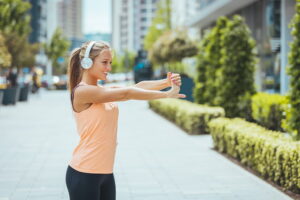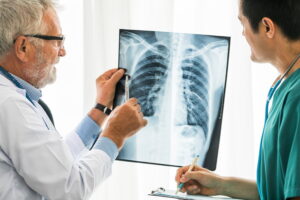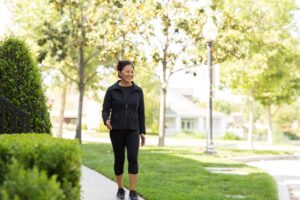Our weather is getting nice for outdoor activities, and guidelines for COVID-19 are starting to ease. What better time to take it outside for a rejuvenating, wellness-boosting nature break?
Research Shows Nature’s Health Benefits
Walking, gardening, hiking, biking, bird watching and other outdoor activities all offer health benefits. Take a walk or a bike ride on our trails or around an area lake, start up a game of Frisbee, or find a serene spot for yoga or stretching. These activities not only help increase our fitness but are excellent ways to relax and relieve tension.
Research shows there are many therapeutic benefits to being in nature: helping with sleep, boosting energy and decreasing stress hormones among them. Studies point out that just a 20-minute ‘nature pill’ can reduce stress hormones. Add several of these sessions per week, and research says you might see decreased depression, anxiety and negative thinking. Time in nature can lower blood pressure and even help with blood sugar control for those with diabetes.
Your physical fitness will improve, too. Get outside to help with weight loss goals, as well as reduce your risk of heart disease. Look to local and state park organizations for programs and trails; it can make for a great family and friend activity, too. Area lakes are another healthy source for fresh air, sunshine and movement.
How to Stay Safe Outside
Here are some things to remember to ensure your safety in the great outdoors:
Use Sunscreen
Choose a broad spectrum sunscreen that blocks both UVA and UVB rays, and make sure it’s a minimum of SPF 15. If you plan to spend the day outside in the sun, boost that to at least SPF 30. Make sure you apply it to all areas of sun-exposed skin, and don’t scrimp! Sunscreen helps prevent the immediate pain from a sunburn, as well as skin cancers related to sun exposure.
Stay Hydrated
Bring plenty of water on your adventure. If you’re exercising or working in the garden, this is doubly important. Most healthy adults should drink about 2 liters of water per day. This need increases with strenuous activity or time spent in the heat. Sports drinks replenish electrolytes lost through sweating and may be useful if you’ve been exercising or if you’re prone to sweating a lot.
Signs of heat-related illness may at first be mild. However, symptoms can become progressively worse and may involve elevated temperatures, lightheadedness, nausea, vomiting and muscle cramps. Severe dehydration often requires emergent treatment and IV hydration. The best treatment for dehydration is truly prevention.
Remember Insect Spray
This is especially important if you’re hiking or spending time in more undeveloped areas, like lakes and wooded parks. Mosquitoes, spiders and ticks can be more trouble in warmer weather. While most bug bites are only a nuisance, some can cause more serious diseases such as West Nile, Zika and Lyme disease. Choose an Environmental Protection Agency-registered repellent that has DEET, picaridin, IR3535, oil of lemon eucalyptus (OLE), para-menthane-diol (PMD) or 2-undecanone as the active ingredient.
Always read the label, but some general precautions include:
- If using both sunscreen and bug repellent, apply the sunscreen first
- Do not use insect repellent on children younger than age 2
- Keep repellent out of the eyes, nose and mouth
- Do not apply bug repellent on children’s palms
- Clean your hands after applying
- Do not apply repellent under clothes
Get Back to Nature for Your Mental & Physical Health
Our culture promotes too many indoor, sedentary activities. It’s time to promote a “back to nature movement” and reap the positive contributions of ‘Vitamin N’.
Whether you go it alone or with others, when you do more activities out in nature, you’ll gain improved fitness and energy, while reducing tension and depression.

Julie Wiekamp, PA-C
Julie Wiekamp, PA-C, is a physician assistant at Cheney Ridge Family Medical Clinic. She cares for patients of all ages and has a special interest in women’s health, nutrition, high blood pressure and diabetes.
Learn more about Julie and the care she provides.








